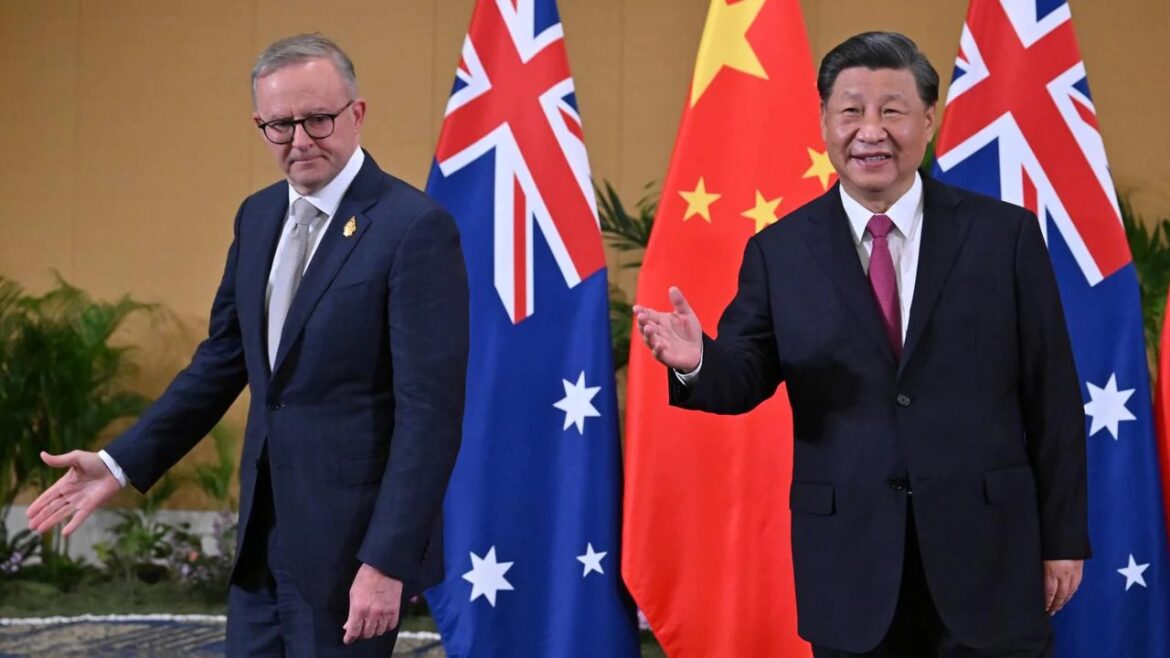Anthony Albanese and Chinese President Xi Jinping hold ‘warm’ meeting in Bali
Anthony Albanese has had a “warm” and “positive” first meeting with Chinese President Xi Jinping in what he says is an important first step towards stabilising the tattered relationship between the countries.
In the relatively short meeting – just over 30 minutes – the prime minister said he raised a wide range of topics, from China’s trade embargo on Australian goods to human rights issues and Russia’s invasion of Ukraine.
In a press conference afterwards, Albanese said nothing should be read into the length of the meeting, which he said ran over schedule and “was very constructive … a warm discussion”.
He said Xi spoke about his visits to Australia “very warmly”, despite no indication of how China would move on any of the key issues raised.
On trade, Albanese said it was not anticipated tonight’s meeting would yield any immediate resolution to China’s trade embargo on Australia.
“If people thought that would happen (today) then that’s not realistic,” he said.
He described the trade discussions as positive and said he put forward Australia’s position “clearly, firmly but politely”.
“We put forward our position and he said that we have highly complimentary economies, so we used similar language,” Albanese said.

Before the meeting, Xi said Australia had been “at the forefront” of China’s relationships with developed countries for a long time, something worth “cherishing”.
“In the past few years, China-Australia relations have encountered some difficulties, which we didn’t want to see, because both China and Australia are important countries in the Asia-Pacific region,” he said.
“We should improve, maintain and develop the relations between the two countries, which is in the fundamental interests of the two peoples and conducive to promoting the development of peace in the Asia-Pacific region and the world.”
The president attached “great importance” to Albanese’s repeated pledge to deal with China in a “mature” way.
On Ukraine, Albanese said he urged Xi to exert China’s influence on Russia, “specifically about Russia’s threat to use tactical nuclear weapons”.
“I noted that China had called that out and that is a good thing,” Albanese said.
Xi is Russian President Vladimir Putin’s most powerful ally and seen as having the potential to influence the direction of the war.
Albanese said he also “put forward the differences we have on human rights issues” and specifically raised the cases of detained Australians Cheng Lei and Dr Yang Hengjun.

On Taiwan, Albanese said he asserted Australia’s position to support the status quo.
He said the AUKUS coalition (between Australia, the United Kingdom and the US) was not raised.
Albanese said he also raised climate change and “the need for us to work together”. He said he referenced the current floods in NSW as an impact Australia is feeling.
“Climate change is a global issue and it requires a global response and china has an important role to play,” he said.
He said there were no resolutions to any of the topics but outcomes shouldn’t be expected from such a meeting.

‘Many steps yet to take’
The pair smiled as they shook hands in front of their nations’ flags ahead of what was the first first bilateral talks between Xi and an Australian prime minister in six years.
After the meeting, Albanese released a statement saying “there are many steps yet to take.”
“We will cooperate where we can, disagree where we must, and engage in our national interest,” Albanese said.
“China is a major power with global interests and it was valuable to exchange views on challenges to international peace and security, including Russia’s invasion of Ukraine.
“We also discussed bilateral, trade, consular and human rights issues, and looked forward to the 50th anniversary of diplomatic relations in December.

“I reaffirmed the Australian government’s view that it is in the interests of both sides to continue on the path of stabilising and developing our comprehensive strategic partnership.
“We are always going to be better off when we talk to each other, calmly and directly.”
With the media still in the room before the meeting began, Albanese acknowledged Australia and China “have had our differences” but said he was hopeful of “a constructive exchange and dialogue today”.
“I am very pleased that we are having this meeting here today,” Albanese said.
“It comes at a time of great global uncertainty. We’re facing challenges of COVID and the recovery, dealing with climate change, and also supply chain shocks.
“As we manage these challenges, we need to work towards a stable, prosperous and peaceful Indo-Pacific, and an international system that is governed by international law and the principles that are enshrined in the United Nations charter.
“We have had our differences, and Australia won’t resolve from our interests or our values, but our bilateral relationship is an important one. Both sides have worked to stabilise the relationship based upon mutual respect and mutual benefit.”








